De Montfort University
 | |
Former names | Leicester School of Art, Leicester Colleges of Art and Technology, Leicester Polytechnic |
|---|---|
| Motto | Excellentia et studium (Latin) |
Motto in English | Excellence and Zeal |
| Type | Public |
| Established |
1992 – gained University status 1870 – Leicester School of Art |
| Endowment | £1.17 m (2015)[1] |
| Chancellor | Doreen Lawrence, Baroness Lawrence of Clarendon |
| Vice-Chancellor | Dominic Shellard |
| Students | 19,650 (2014/15)[2] |
| Undergraduates | 16,020 (2014/15)[2] |
| Postgraduates | 3,630 (2014/15)[2] |
| Location | Leicester, England |
| Affiliations | Association of Commonwealth Universities |
| Website |
www |
De Montfort University (DMU) is a public university in the city of Leicester, England.
In 2008, 70% of the university's research was deemed 'world leading' (40%), or 'internationally excellent' (30%) in the United Kingdom Research Assessment Exercise. The assessment also highlighted a particular strength in English literature, where its RAE score equalled the University of Cambridge.[3] The university has the second highest number of National Teaching Fellows of all UK universities.[4] The university ranked 53rd in the Times University rankings for 2016.[5]
The university is organised into four faculties: Art, Design, and Humanities; Business and Law; Health and Life Sciences; and Technology (comprising Computing Sciences and Engineering). There is also the Institute of Creative Technologies which researches the intersections of art, science, technology and multidisciplinary working.
History
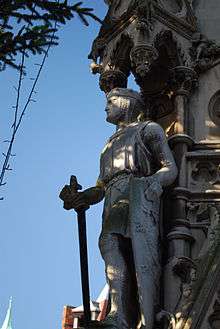
Origins
The university's origins are in the Leicester School of Art, established in 1870 on a voluntary basis. The school expanded in response to the changing needs of late 19th-century industry; leading to the introduction of subjects such as engineering, building and machine drawing.[6] By 1897, it was clear the buildings being used were no longer suitable. £25,000 was raised to build 'a very handsome school that would be enormous credit to the town and ... so that it would answer its purpose for the next 100 years'. The building in question is the Hawthorn Building, which today still houses the sciences; in the shape of the Faculty of Health and Life Sciences. At the time of the first phase its construction, there were 500 art students and 1,000 technical students. In 1903, a letter from Her Majesty's Inspector praised the success of the technical subjects. Increasing demand for courses prompted an extension to the Hawthorn Building in 1909. In 1919, further properties were rented. The Duchess of Atholl laid the foundation stone of Hawthorn's new west wing in 1927; by which time the establishment was known under by the joint name of The Leicester Colleges of Art and Technology.[6]
In 1930, the college was recognised for the External Degree course in Pharmacy of the University of London, and the Pharmaceutical Chemist Diploma of the Royal Pharmaceutical Society of Great Britain. In 1934, the university of London recognised the college as suitable for preparing students for the External Degree in Engineering, and so the courses on offer developed apace. The prospectus for 1936–37 included details of various technically based schools, including the Schools of Architecture, Building and Building Crafts, and Engineering.[6] The fourth phase of extensions to the Hawthorn Building was completed in 1938–39. The first accommodation was secured in 1946 when three houses were purchased by the university.[7]
More space was needed to meet the academic demand, and so in 1948, Mr F. Bray, Under Secretary of the Ministry of Education, opened the converted Downings Warehouse. In 1966, the new Fletcher building was opened by HM The Queen Mother. In the same year, a white paper, "A Plan for Polytechnics and Other Colleges", was published, leading to the creation of the City of Leicester Polytechnic. Under the provision of the Education Reform Act of 1988, Leicester Polytechnic became a Higher Education Corporation, with Dame Anne Mueller appointed Chancellor in June 1991.[6]
Leicester Polytechnic became De Montfort University in accordance with the Further and Higher Education Act in 1992, establishing it as a degree awarding body in its own right.[8] The name De Montfort University was taken from Simon de Montfort, a 13th-century Earl of Leicester credited with establishing the first parliament in 1265.[7]
Expansion and contraction
In the 1990s the institution aimed to become a multi-campus collegiate university covering the entire East Midlands, and as such, the university swiftly acquired other campuses. Leicester Polytechnic built a new campus in Kents Hill in Milton Keynes, across the road from the Open University – the first brand new higher education campus built in Britain for twenty years. This took its first students in 1991 and was officially opened by Queen Elizabeth in 1992, prior to the official foundation of De Montfort University as a New University; it was branded The Polytechnic: Milton Keynes until it became De Montfort University Milton Keynes. Departments at Milton Keynes included Computer and Information Sciences, Built Environment and Business.
In 1994 De Montfort University took over the higher education activities of the Bedford College of Higher Education, while the further education section remained independent under the name Bedford College. The university absorbed the Lincolnshire College of Art in Lincoln, and the Lincolnshire College of Agriculture and Horticulture in Caythorpe, Lincolnshire in 1994; and the Riseholme Agricultural College in Riseholme, Lincolnshire and the Leicester-based Charles Frears College of Nursing and Midwifery in 1995.
Since 2000, the university's expansionist policy has been reversed, with all outlying campuses being sold off. The Bedford campus merged with the University of Luton to form the University of Bedfordshire; the campuses in Lincolnshire were transferred to the University of Lincoln; and the Milton Keynes campus was closed in 2003, with its buildings taken over by the Open University. The institution divested itself of its last outlying site, Charles Frears (on London Road in Leicester), in 2011, when the nursing school moved to the city centre campus.
Present day
The university has approximately 27,000 full and part-time students, 3,240 staff and an annual turnover in the region of £168 million.[9] Its campus comprises ten halls of residence offering around 3,000 university sourced rooms, and is approximately a ten-minute walk from Leicester city centre.
The proceeds from the campus sales have been ploughed back into the Leicester City Campus, which has consequently seen a large amount of development, including the construction of two new buildings and the extensive refurbishment of a third, the Edith Murphy building (formerly Bosworth House) to house the students and staff of the School of Nursing and Midwifery, previously based at Charles Frears.
The Performance Arts Centre for Excellence (PACE), funded by a £4.5 Million grant from the Higher Education Funding Council for England, was opened in 2007 by the BBC's Creative Director Alan Yentob.[10] A new building for the Faculty of Business and Law – the Hugh Aston building – opened in September 2009. The new Business and Law centre has the Magazine Square at its centre and cost £35 million.[11]
The University’s new £8 million sports facility, named the Queen Elizabeth II Diamond Jubilee Leisure Centre, was opened on campus on 30 July 2012 by Vice-Chancellor, Dominic Shellard.
The former John Sandford Site was renovated to a conference and events centre called 'The Venue@DMU'. This was opened in September 2015
There is a brand new Arts and Design building opening in the centre of the Campus in September 2016, the pedestrianized roads through the campus are also being transformed into a grassed/paved walkway
Campus
The Leicester campus is close to Leicester Castle and occupies what was once a religious precinct of the castle, built by the earls and dukes of Lancaster, known as the Newarke.[12] It is bordered by the 15th-century Magazine Gateway or Newarke Gateway[13] and the campus contains listed buildings, including Trinity House, rebuilt in 1901 and containing part of the original 14th-century Hospital of The Annunciation building.[14] The Hawthorn Building contains the ruins of the 1353 Church of the Annunciation of Our Lady of the Newarke, where the body of King Richard III is said, according to early sources,[15] to have been displayed before his burial at Greyfriars. The ruins form the centerpiece of the De Montfort University Heritage Centre, opened in March 2015. As well as the ruins, the Centre also celebrates the history of the university and contemporary student work.
The campus has seen several recent developments as part of a ten-year £200 million initiative by the university, such as the £35 million Hugh Aston Building; constructed to move students from the Faculty of Business and Law closer to the centre of the university's infrastructure.[16]
Organisation and governance
Faculty of Art, Design and Humanities
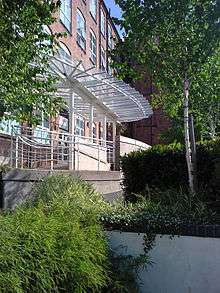
Created from a merger of the previous Faculty of Art and Design and the Faculty of Humanities, the Faculty of Art, Design and Humanities offers traditional humanities subjects including English and History, as well as more design based courses in areas such as Architecture and Fine Art.
Within its humanities division, the Faculty currently holds five National Teacher Fellows; the latest being Deborah Cartmell, Reader in English, who was made a Fellow in recognition of excellence in teaching and learning support. Cartmell developed the university's pioneering Master's degree in Adaptation Studies and is a founding member of the British Shakespeare Association and the Association of Adaptation Studies.[17]
Subjects of the humanities are taught within the Clephan Building, which was refurbished specifically for the Faculty's use. Most of its academic and support staff are also based there. The Clephan Building plays host to the internationally recognised Cultural Exchanges event, which features guests and speakers from the arts, media, literature, politics and film. It began in 2000, and attracts upwards of 4,000 visitors annually. Recent visitors to the festival have included the screenwriter and novelist Andrew Davies, famous for his work in the field of adaptation; novelist Adele Parks, a highly acclaimed women's fiction author nominated for the Romantic Novelist of the Year award; and Janet Street-Porter, a British media personality, journalist, television presenter and producer.[18]
Recently, the Faculty has collaborated with two other European universities to offer a new Master's course, based in its International Centre for Sports History and Culture: the MA Management, Law and Humanities of Sport. Organised by Centre International d'Etude du Sport (CIES) and endorsed by FIFA, the course was created to promote management education within the sports world. It is ostensibly recognised as one of the top graduate programmes in sport, The Humanities of Sport module is organised by the International Centre for Sport History and Culture at De Montfort, whilst the Management of Sport module is taught by SDA Bocconi School of Management in Italy and the final Sports Law module by Université de Neuchâtel in Switzerland. Course patrons have included Joseph S. Blatter, Lord Coe, Sir Bobby Charlton and Sergey Bubka. As of 2010, the course has produced more than 200 graduates from over 70 different nations.
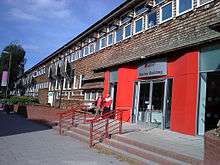
The Faculty boasts the only university courses in the world to specialise in lingerie, underwear, body-wear, swimwear and performance sportswear,[19] which first began after the Second World War. The Faculty also offers the only UK university courses in Footwear Design.[20]
Faculty of Business and Law

The Faculty of Business and Law incorporates the Leicester Business School and the Leicester De Montfort Law School. The Faculty has a long history of international partnerships; in 1997, it collaborated to help found a business school in India – the Daly College Business School.[21]
The Leicester Business School was regarded by The Sunday Times as one of the top 10 business schools in the UK,[22] whilst the 2007 National Student Survey ranked it seventh out of 110 institutions for student satisfaction.[23]
It comprises more than 4000 students and 150 academic staff, making it one of the larger providers of business and management education in the UK.
The Faculty of Business and Law is based in the Hugh Aston Building; a £35 million investiture officially opened in March 2010 by Patrick McKenna, founder and Chief Executive of Ingenious Media, one of the country's leading media investment companies. The event took place in the presence of a cross section of the local and academic community. Various activities took place during the day, including a mock court trial, a performance of the music of Hugh Aston, a Tudor composer, a lecture by Patrick McKenna and a celebratory lunch and reception. The construction of the building released the 14th-century Magazine Gateway from four lanes of traffic, allowing an attractive tree-lined square to be created; the Magazine Square.
The building's namesake, Hugh Aston, died in November 1558 and was a leading figure of his generation; serving at different times as Coroner, Mayor and Member of Parliament for the borough of Leicester, as well as being one of the foremost early Tudor composers.[24]
Faculty of Health and Life Sciences

The Faculty of Health and Life Science is De Montfort's largest faculty, housing roughly 400 full-time and part-time staff, as well as approximately 5000 students. It is composed of four interconnected schools: Allied Health Sciences, Applied Social Sciences, Nursing and Midwifery and the Leicester School of Pharmacy.
The Faculty is based in the Hawthorn Building, which was previously an Arts College; boasting an art-deco turn style and stage area which now functions as a lecture theatre. David Bowie and Jimi Hendrix were reported to have played at the venue in the 1960s. There are ancient archways visible on the lower ground floor; supposedly remnants from a monastery which occupied the site prior to the building's construction.
The Faculty underwent a major change in 2000 when the School of Biology, based at Scraptoft Campus, moved to the Leicester Campus, and the faculty will become fully centred around the university's City campus in 2011 when the School of Nursing relocates from the Charles Frears campus.
The four schools interrelate so as to allow collaboration across subject boundaries in teaching, consultancy and research. Between them, the Schools cover not just laboratory sciences but Child, Adolescent and Family Therapy; Community Studies; Community and Criminal Justice; Counselling and Psychotherapy; Applied Criminology; Applied Criminology with Psychology; Criminology and Criminal Justice; Environmental Awareness; Management; Protection and Technology; Forensic Science; Health and Community Studies; Midwifery; Nursing; Pharmacy; Psychology; Psychology with Criminology; Social Work; and Speech and Language Therapy.
In addition, the Community and Criminal Justice Division in the School of Applied Social Sciences is one of only 3 HEI providers nationally [England and Wales] with regard to the provision of both a Foundation degree and Graduate Diploma [both are work based] in Community and Criminal Justice Degree run in association with the National Offender Management Service.
Faculty of Technology
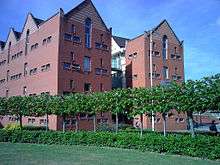
Originally Faculty of Computing Sciences and Engineering, renamed on 1 October 2008. Descended via the former Leicester Polytechnic from the old Leicester College of Technology.
The main faculty building is the Queens Building, its unique design means that the building has no need for heating as it controls the temperature through a series of vents.
The Institute of Creative Technologies
The Institute of Creative Technologies (IOCT), which opened at De Montfort University in 2006, undertakes interdisciplinary research in emerging areas at the intersection of Science, the Digital Arts and the Humanities. Post-graduate students are engaged in research in a wide variety of areas reflecting the inter/transdisciplinary nature of the IOCT.
Governance
The university is governed primarily through its Board of Governors, which is chaired by Ian Blatchford, Director of the Science Museum Group.
Reputation and rankings
| THE[25] (2016/17, national) | 70 | |
|---|---|---|
| THE[26] (2016/17, world) | 601-800 | |
| Complete[27] (2017, national) |
54 | |
| The Guardian[28] (2017, national) |
61 | |
| Times/Sunday Times[29] (2017, national) |
53 | |
The university has one of the largest numbers of Teacher Fellows of any UK university and was awarded Centre of Excellence status for its performance practice teaching and student support.[30] This award has enabled further investment in research as well as the construction of a new building with state-of-the-art performance studios, rehearsal areas and the latest technology.
Affiliations and partnerships
The university has special arrangements with more than 80 universities and colleges in over 25 countries, including Nanjing University, ranked 120th in the world by the Times Higher Education and situated in Jiangsu Province, eastern China. The two universities have launched various initiatives, including a scholarship programme for De Montfort students and doctoral study coupled with English language tuition for students from Nanjing. De Montfort's Institute of Creative Technologies will also advise Nanjing University on a digital recreation of medieval China, following the success of the institute in developing a virtual rendition of Leicester during its Roman occupation.[31]
The numerous cultural partnerships that the university holds currently include a link with Leicester City Football Club, utilising the university's expertise in sports history to help make the club's heritage more widely available, as well a partnership with the British Library, which will see the two institutions working together in order to boost research and cultural activities.[32] The university has also collaborated with Leicester in the creation of the Digital Media Centre (DMC) in Leicester city centre, which received £1 million in funding from the university. Through the university's involvement, the DMC will benefit from the latest research in media and related technologies. Students on appropriate courses will have the opportunity to use the production and educational facilities at the Centre.
The university was a member of the University Alliance group, but left in October 2013.[33]
Student facilities
Campus Centre
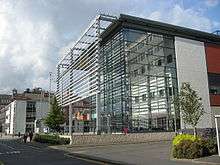
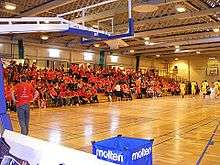
The Campus Centre offers numerous facilities for students at De Montfort University. The building was completed in September 2003, and sits at the heart of De Montfort University's Leicester City site, fulfilling a number of functions and providing a wide range of services.
The building is a three floor steel frame construction with a glass curtain wall frontage designed by Ellis Williams Architects, the company responsible for the Baltic Centre for Contemporary Art in Gateshead. It was constructed by Balfour Beatty on the site of the old Stibbe building, at a cost of £8.5 million and is central to the university's 'Masterplan', which seeks to regenerate the Leicester campus environment.[34]
It houses the De Montfort University Students' Union, comprising various societies such as Demon FM[35] a student radio station that runs 24 hours a day on a community licence; Demon TV;[36] and The Demon,[37] a student-run newspaper published fortnightly through term time. The Union also operates a lettings agency in a joint venture with the University of Leicester Students Union. The service which operates from both campuses is known as SULETS. There is a food court situated in the building, as well as a bar/venue named 'Level 1' and a pub named 'The Graduate'. There is also a Spar supermarket.[38]
Library and Learning Services
DMU Library Services gained a satisfaction rating of 4.2 in the 2010 National Student Survey.[39] The four Library sites on campus consist of the main Kimberlin Library and three ancillaries. Many Library functions are also available off campus at any time, including electronic resources such as academic databases, and online account management facilities such as book renewal.
The Kimberlin Library
The Kimberlin Library is a four-storey building named after Mr A.H.W. Kimberlin who, as Chairman of the Board of Governors, and in other roles, made a major contribution to the development of the colleges and polytechnic that later became De Montfort University. Opened in 1977, extended in 1997 and extensively refurbished in 2007, Kimberlin Library is open seven days a week (including overnight opening on weekdays) during term time, enabling students to study whenever it suits their schedule. The ground floor Learning Zone was opened as part of the 2007 refurbishment and provides space for group and individual work and has workstations with power supplies for laptops.
There are also syndicate rooms available for use by students, comprising interactive whiteboards as well as DVD and video facilities. These provide students with opportunities to collaborate and rehearse presentations. Kimberlin Library has an overall seating capacity of around 1250, of which around 475 have PC or MAC provision. The upper floors of the library cater for more traditional Quiet and Silent study needs.[40]
Further investment in 2011 saw the opening of the library Archives and Special Collections rooms and a dedicated Research Postgraduate Study Room. There are also facilities, including dedicated study rooms, for students with disabilities and special needs.[41]
The Eric Wood Learning Zone
The ground floor of the adjacent Eric Wood Building was extended and developed into a second Learning Zone, providing 180 more modern study places and up-to-date study facilities. This was opened on 12 January 2009.
The Greenhouse
Offering a third learning space, but with a twist on previous Learning Zones, 'The Greenhouse' opened on 3 October 2011. With accommodation for another 200 study spaces in a mixture of environments, this facility was developed by Library and Learning Services in part of the former Gateway College buildings on Richmond Street.
The Law Library
Situated in the Hugh Aston Building which opened in September 2009, Leicester Law School is one of only a few in the country to have a dedicated Law Library on site within the teaching building. One room within this library houses the separate Legal Practice Course library, to which only students on that course have access.
Notable academics
- Gavin Bryars, composer
- James Stevens Curl, architectural historian, architect and author
- Gary Day
- Christopher Duffy
- Barry Dufour (Visiting professor), academic [42]
- Simon Emmerson, composer
- Desmond Fernandes
- David Greenaway, economist
- Ian Hall
- Robert Hewison
- Christopher Hobbs
- Derek Hockridge
- John Hoskin
- Andrew Hugill
- Chris Joseph, writer
- Stephen Thomas Knight
- Leigh Landy
- Jim Marshall
- Nicholas J. Phillips
- Kate Pullinger
- John Richards, musician
- Martin Rieser
- Michael Scott
- Debbie Sell
- Dominic Shellard
- Dave Smith, composer
- Sue Thomas, author
- John Young, composer
- See also Academics of De Montfort University.
Notable alumni
Academics
- Louis de Bernières, Novelist
- Michael Scott, is the current Vice-Chancellor of Glyndŵr University in Wrexham, Wales.[43]
Business
- Helen Milligan, runner-up on The Apprentice series seven (2011)
- Janette Pallas, Former Head of Enterprise Services
- Qais Al Khonji , Famous Omani Entrepreneur
- Nicola Pellow, Website designer
- Ken Shuttleworth, architect
- Tony May ISD
Fashion
- Laura Coleman, model, Miss England 2008
- Jimmy Choo OBE, footwear designer[44]
- Nichole de Carle, lingerie designer
- Liam Fahy, footwear designer
- Karolina Laskowska, lingerie designer
- Janet Reger, lingerie designer
Health & medicine
- Debbie Sell, Speech and language pathology therapist
Artists, entertainers and journalists
- John Bain, Game commentator
- Martin Ballard, BBC Radio Presenter
- Zarina Bhimji, Photographer and filmmaker
- Justin Chadwick, actor, TV and film director
- JS Clayden, Vocalist for Pitchshifter, founder of PSI Records
- Marverine Cole, Sky News, Radio and Television presenter
- Dorothy Cross, Artist and sculptor
- Vivek Dahiya, (Indian TV Actor)
- Charles Dance, OBE, Actor
- Pete Donaldson, Broadcaster
- Keeley Donovan, BBC Presenter
- Alun Evans, Journalist, Football Association of Wales CEO
- Mike Foyle, Music producer
- Christian Furr, Artist
- Andy Gotts, Photographer
- MJ Hibbett, Singer-songwriter
- Akram Khan, Dancer
- Nero, Music producer
- QBoy, Rapper and producer
- Simon Rimmer, chef on Channel 4's Sunday Brunch
- Nick Ruston, Artist and sculptor
- David Shrigley, Artist
- Simon Wells, Film Director
Law & order
- Michael Beloff QC, Barrister[45]
- Geoffrey Bindman QC, Prosecution Barrister[46]
- Sally-Ann Hales QC, Criminal law Barrister[47]
- Helena Kennedy, Baroness Kennedy of The Shaws QC, FRSA, British barrister, broadcaster, and Labour member of the House of Lords.[48]
Politics & government
- Simba Makoni, Zimbabwean politician, former Minister of Finance and Economic Development (2000–2002)
- Margot Parker, UK Independence Party MEP
- Andy Reed OBE former Labour Party MP for Loughborough
- Angela Smith, former British Labour Party politician MP for Basildon
- Sir Peter Soulsby, MP, British Labour Party politician and Mayor of Leicester
- David Taylor, British Labour Party politician, MP for North West Leicestershire
Sport
- Eddie "The Eagle" Edwards, International ski jumper
- Harry Ellis, Former Rugby Union England International
- Kim Joo-Sung, former Korean International football player
- Lewis Moody MBE, Former Rugby Union England Captain
- Geordan Murphy, Professional Irish International. Captain of Leicester Tigers R.F.C
- Budge Pountney, former Scotland International, former Director of Rugby for Northampton Saints R.F.C
References
- ↑ "Annual Reports and Financial Statements 2014-2015" (PDF). De Montfort University.
- 1 2 3 "2014/15 Students by HE provider, level, mode and domicile" (XLSX). Higher Education Statistics Agency. Retrieved 19 January 2016.
- ↑ "RAE 2008: Quality Profiles". Research Assessment Exercise.
- ↑ "DMU Top in region for National Teaching Fellowship". De Montfort University.
- ↑ "University Guide - The Sunday Times".
- 1 2 3 4 "Key events before 1992". De Montfort University.
- 1 2 "De Montfort University – History". De Montfort University. Retrieved 1 March 2013.
- ↑ "Key events after 1992". De Montfort University.
- ↑ "Annual Accounts 2014-15" (PDF). De Montfort University. Retrieved 30 March 2016.
- ↑ "Performance Arts Centre for Excellence (PACE) Building". De Montfort University.
- ↑ "Hugh Aston Building". De Montfort University. Retrieved 20 December 2010.
- ↑ Charles James Billson, Mediaeval Leicester, (Leicester, 1920)
- ↑ "Leicester Castle and the Magazine Gateway: Scheduled Monument", Leicester City Council, retrieved 8 March 2012.
- ↑ "Trinity Hospital Almshouses, Leicester", British Listed Buildings, retrieved 8 March 2012.
- ↑ A. Carson, J. Ashdown-Hill et al, Finding Richard III (Imprimis Imprimatur 2014)
- ↑ "DMU Campus Development". De Montfort University.
- ↑ "National Teaching Fellows". De Montfort University.
- ↑ "Cultural Exchanges festival". De Montfort University.
- ↑ "Leicester – Showcase – De Montfort University Contour Fashion Graduate Show 2002". BBC.
- ↑ "Art and Design Research". De Montfort University.
- ↑ "International Partnerships: Daly College Business School". De Montfort University. Retrieved 20 December 2010.
- ↑ "Leicester Business School". De Montfort University.
- ↑ "Faculties – Index". De Montfort University.
- ↑ "Hugh Aston – homepage index". De Montfort University.
- ↑ "World University Rankings 2016-17 - United Kingdom". Times Higher Education. Retrieved 21 September 2016.
- ↑ "World University Rankings 2016-17". Times Higher Education. Retrieved 21 September 2016.
- ↑ "University League Table 2017". The Complete University Guide. Retrieved 25 April 2016.
- ↑ "University league tables 2017". The Guardian. 23 May 2013. Retrieved 23 May 2016.
- ↑ "The Times and Sunday Times University Good University Guide 2017". Times Newspapers. Retrieved 23 September 2016.
- ↑ "De Montfort University Profile". The Good University Guide.
- ↑ Documents. "Collaboration with Nanjing University". Dmu.ac.uk. Retrieved 2012-06-17.
- ↑ "De Montfort University – Leicester, UK". Retrieved 16 July 2015.
- ↑ "DMU leaves the University Alliance". DMU. Retrieved 11 October 2013.
- ↑ "De Montfort University – Leicester, UK". Retrieved 16 July 2015.
- ↑ "Demon FM".
- ↑ "Demon TV".
- ↑ "The Demon".
- ↑ "Campus Centre Building". Retrieved 20 December 2010.
- ↑ Archived 6 April 2010 at the Wayback Machine.
- ↑ "Library". De Montfort University – Leicester, UK.
- ↑ "Library disability pages". De Montfort University – Leicester, UK.
- ↑ "Barry Dufour".
- ↑ "Glyndŵr University's Board of Governors". Glyndŵr University. Retrieved 2008-07-19.
- ↑ "Shoe guru Jimmy Choo named world's most outstanding Chinese designer". Retrieved 16 July 2015.
- ↑ "LEGENDARY ADVOCATE MICHAEL BELOFF QC IS TO RECEIVE AN HONORARY DEGREE FROM DE MONTFORT UNIVERSITY IN LEICESTER". Retrieved 16 July 2015.
- ↑ Bindmans. "Sir Geoffrey Bindman QC (Hon)". Retrieved 16 July 2015.
- ↑ http://www.18rlc.co.uk/index.php/barristers/hales/151
- ↑ Helena Kennedy QC Doughty Street Chambers
External links
| Wikimedia Commons has media related to De Montfort University. |
- De Montfort University – Official website
- De Montfort Students' Union – Official website
- De Montfort University archives
Coordinates: 52°37′47″N 1°08′20″W / 52.62973°N 1.13897°W